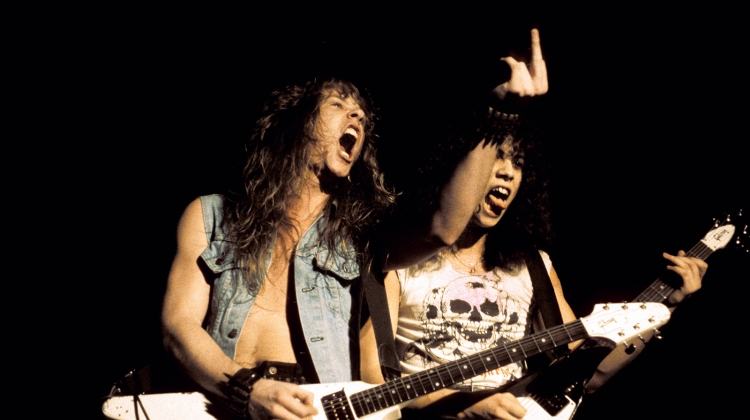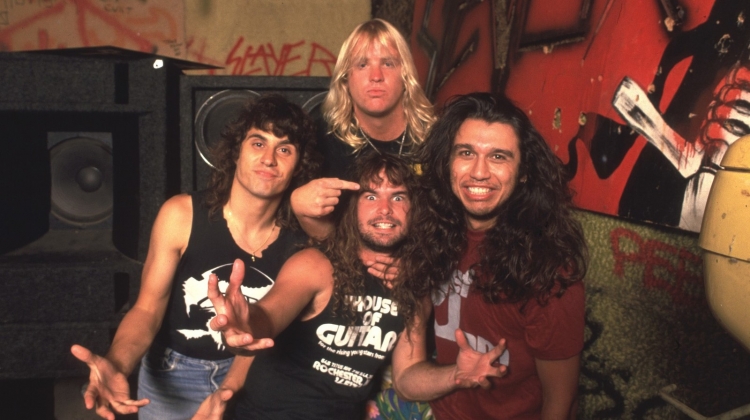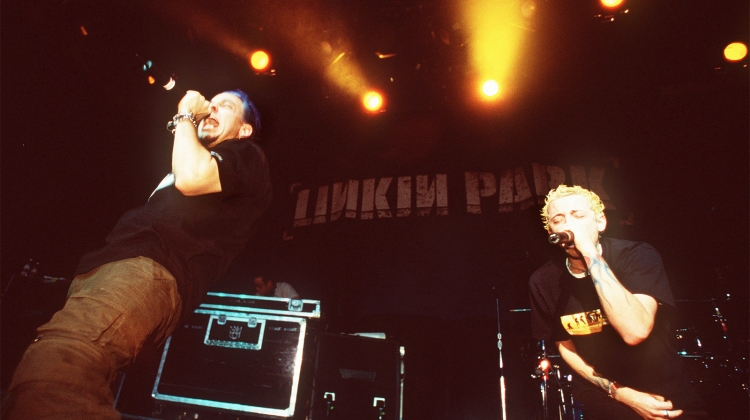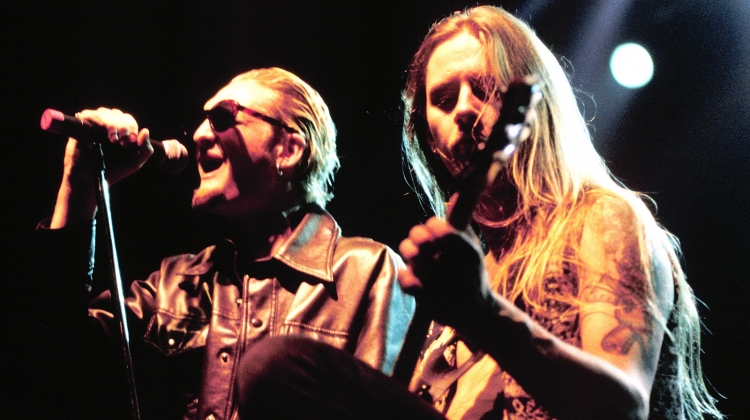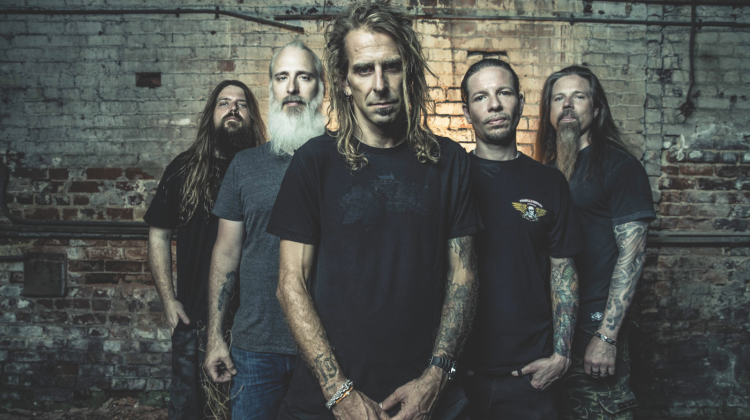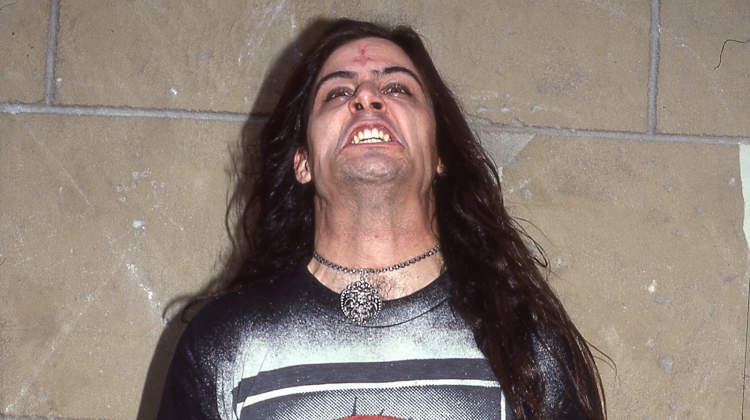By the early Nineties, the heyday of thrash metal had given way to the grunge phenomenon and a total fracturing of heavy music as a whole. While the flannel-draped Seattle scene was reveling in the radio success of bands like Nirvana and Alice in Chains, and thrash stalwarts Metallica were enjoying a massive mainstream breakthrough with the bluesy makeover of their sound, true metal believers like Pantera were shedding the vestiges of glam for something much more aggressive and macho, as witnessed on the aptly titled Vulgar Display of Power.
Experiencing a concurrent rise in popular culture was hip-hop, dominated by gangster rap artists like Tupac and Notorious B.I.G., and pushing into even the most white-bread Middle American consciousness when hits like Sir Mix-a-lot's "Baby Got Back" took over the airwaves. Somewhere in the center of all these splintering but complementary styles came a California band that sounded like no other, much to the derision of music critics everywhere despite the rabid fandom they'd soon build: Korn.
Hailing from Bakersfield, California, Korn arguably invented the nu-metal genre with their 1994 self-titled debut. Drawing vocal stylings, fashion and rhythmic elements from hip-hop and utilizing heavy sounds pulled from the extreme-metal underground, the fledgling band refused to shy away from their sensitivity and instead broke out head-on with stories of trauma, abuse and bullying, connecting with fans who saw Korn's music as an outlet for the aggression they felt buried inside.
Going on to sell over 10 millions copies worldwide, the band's eponymous debut album solidified Korn's status as one of the biggest game-changers to hit music in the 1990s. Though they inspired countless knockoff bands who still inspire mostly intense abhorrence from those who've been around long enough to recall the joke nu-metal became, Korn also paved the way for some of the biggest metal bands in the world to come into existence (Slipknot, anyone?) and still enjoy a prolific and successful career today. As the Ross Robinson–produced album turns 24 years old, read up on some lesser known facts surrounding its recording and release way back in 1994.
1. Jonathan Davis quit his job as a mortician to join the band
"I've pulled so many dead bodies out of cars," the singer once said of his short stint as a mortician in training. "It's like a puzzle. Trying to figure out how someone died." As fascinating as he found the work, Davis found it traumatic, as well, noting in an interview with Addicted to Noise, "I learned is to appreciate life more. I cut up a lot of my friends, and have seen everything that I could possible imagine, every kind of heinous crime you could imagine."
Davis ended up giving up mortician work for Korn, and while he obviously doesn't regret the decision today, at the time it seemed like it might not be the best choice. "I had to fucking quit my job where I was making great money as a mortician," he told Rolling Stone, "had my own house, to fucking having nothing, working at a pizza place as a shift manager living under some stairs." And speaking of those stairs ...
2. Korn lived together in a Huntington Beach house prior to the album's recording
The unique sound and vision that Korn achieved on their debut is likely owed in part to the friendship and drive they formed together in their early days as roommates, not just bandmates. All the members (with the exception of former drummer David Silveria) cohabitated in a house in Huntington Beach, California. Davis took the small room under the stairs because he made less money than the others after leaving his mortician job, with some of his depleted funds going to a serious meth habit that would bleed into the recording of the album. Speaking of meth ...
3. Davis recorded "Ball Tongue" while high on meth
During the tracking for "Ball Tongue," Davis recalled to Rolling Stone, the singer went to his dealer and "got a big ol' fat rock of meth, chopped that shit up and I did vocals." The song is about a close friend of the band's, from Huntington, and drugs were actually relevant to the title. "That was his nickname because when he was tweaking, he'd just sort of seize up and his tongue was like a ball," Davis explained, adding, "All that crazy, scatting shit, that was all from me probably being up too long."
4. Korn owe "Faget" to Duran Duran
The controversially titled song was one of the first to really stand out among the machismo that had dominated heavy metal in the Eighties and early Nineties. While other metal musicians were pulling inspiration from thrash gods like Metallica and Slayer or finding aggro comradery in the pits of Pantera shows, Jonathan Davis was writing epithets to the bullies who tortured him for being a sensitive New Wave kid who just wanted to wear eyeliner and listen to Duran Duran. The synth-pop superstars were Davis' favorite group in high school, inspiring his teenage wardrobe's effeminate flair, making him a prime targe for his peers' adolescent homophobic rage. He recalled, "I was a New Romantic, and I got picked on a lot so I wrote that song about that."
5. The demo to "Blind" was recorded on one of W.A.S.P.'s guitars
"when we were doing the demos, I think it was W.A.S.P. was doing their record or some shit," Davis recalled to Rolling Stone. "So when W.A.S.P. went home at night, we'd sneak in and use their shit, so we'd be up all night. And [producer Ross Robinson] gave us wheatgrass to keep us up. Yeah, the demo of 'Blind' was one of Blackie Lawless' guitars, I believe. Fucking funny, huh?"
6. The bagpipe intro to "Shoots and Ladders" was captured with Davis playing outside the studio, walking away from the mic
Bagpipes, though they might not necessarily seem very "metal," are actually one of the loudest instruments in the world and need very little amplification by design. While the bagpipe wails that open "Shoots and Ladders" might like they were recorded on top of a mountain, Davis actually played them while walking past the back door of the studio while the microphone stayed stationary, giving the impression of a faraway player fading into the distance. You can hear more on the full process in this interview with Robinson.
7. Guitarist Brian "Head" Welch would sleep in the vocal booth during the recording of the album
On the same property as the studio, there was a cabin where Korn were intended to sleep during the making of the record. Most of the band members did so, except for guitarist Brian "Head" Welch. "Staying in the chateau I remember waking up and it was sweltering hot. The sun would just bust through that fucking place," Davis recalled. "Head took over my vocal booth and he slept in there — he was smart."
"We would get these foam things, the ones that would deaden the sound," Head confirmed. "I'd put them on the floor, then get blankets and stuff and sleep in there. We were drinking a lot, so I didn't really care about comfort."
8. The girl swinging on the album cover was the niece of one of Korn's label reps and was paid $300 for the gig
As photographer Stephen Sticker, who shot the Korn cover, revealed to Revolver in 2013, the child on the swing in the chilling image was a member of Korn's extended family — namely, Justine Ferrara, the niece of Immortal Records rep Paul Pontius. Just eight at the time, Ferrara was paid $300 for her swinging skills, and for his part, Pontius "was in the doghouse with his family" once the album came out, Stickler reported. "I heard my parents weren't too happy," Ferrara confirmed to us in 2013. "And my mom wasn't keen on punk kids recognizing her little girl in the supermarket. But I think it's cool. I got some modeling under my belt."
9. Davis kicked his meth habit on the album's first big promotional tour
The singer, who has now been free of alcohol and recreational drugs for over 20 years, used to rely on amphetamines to get by. Davis told the story of drying out on the road to Rolling Stone: "I kicked speed in that RV. I did my last line, I fuckin' jumped in there, they built a bunk for me, and I slept all the way from Huntington Beach to Atlanta," he recalled. "I think it was four days 'cause this fucker kept breaking down and shit. You stay up fuckin' two or three days at a time, your body just needs to sleep. Your body needs to repair itself and it goes down for a long time."
10. The visceral breakdown in "Daddy" was totally unscripted
Korn's darkly disturbing closing track focuses on child abuse, specifically that inflicted on Davis by a babysitter when he was a young child. He came forward with the info to his parents, only to have them brush his admission off as a youthful lie. Carrying this pain with him for life, Davis wrote the gut-wrenching epic to help himself heal from the trauma.
For four minutes at the end of the song, Robinson motioned for the rest of the band to keep jamming while Davis had an incredibly harrowing breakdown in the vocal booth, completely unaware the tapes were still rolling. The genuine pain captured helped endear the group to a generation of fans who found common ground in their shared angst, and the difficult listen is still considered almost universally to be Korn's most emotionally devastating song.
"I remember that moment, when I came out of there, and I was fucking sobbing, my whole band was crying, and they just all hugged me and shit. It was a crazy fucking experience…," Davis recalled to Rolling Stone. "It was the good ol' days, dude. We were all a band of brothers. We were like the fucking Three Musketeers."




